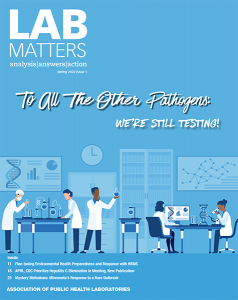On Thursday, September 1, 2022 the Wisconsin State Laboratory of Hygiene (WSLH) will begin testing for Mycoplasma genitalium using the Aptima Transcription-Mediated Amplification (TMA) assay. This assay uses nucleic acid probes and TMA for the qualitative detection of ribosomal RNA (rRNA) to aid in the diagnosis of M. genitalium infection. The M. genitalium assay uses the same Aptima collection kits currently used for CT/GC testing and a single specimen can be used for multiple tests. M. genitalium testing is available for patients 14 years and older.
Monkeypox Testing Information
Stay up to date with Monkeypox testing information at the WSLH on our Monkeypox-2022 web page.
4th of July 2022 Holiday Hours
Please note the following changes to the Wisconsin State Laboratory of Hygiene’s operations for the July 4th holiday.
As always, if you have an off-hours emergency, please call the WSLH Emergency Pager at 608-263-3280.
| DATE |
2601 Agriculture Drive Clinical Specimen Receiving Direct phone: 608-224-4229 |
465 Henry Mall Clinical Specimen Receiving Direct phone: 608-265-9188 |
| Saturday, July 2, 2022 | 6:30 AM – 12:30 PM | 7:00 AM – 12:00 Noon |
| Sunday, July 3, 2022 | CLOSED | CLOSED |
| Monday, July 4, 2022 | CLOSED | 7:00 AM-12:00 Noon Newborn Screening Specimens Only |
Memorial Day 2022 Holiday Hours
Please note the following changes to the Wisconsin State Laboratory of Hygiene’s operations due to the observance of the Memorial Day holiday.
The table below lists the hours of operations for our Clinical Specimen Receiving departments.
As always, if you have an off-hours emergency, please call the WSLH Emergency Pager at 608-263-3280.
| DATE |
2601 Agriculture Drive Clinical Specimen Receiving (Direct phone: 608-224-4229) |
465 Henry Mall Clinical Specimen Receiving (Direct phone Saturdays/Holidays: 608-262-5817) |
| Saturday, May 28, 2022 | 6:30 AM – 12:30 PM | 7:00 AM – Noon |
| Sunday, May 29, 2022 | CLOSED | CLOSED |
| Monday, May 30, 2022 | CLOSED | 7:00 AM-12:00 Noon Newborn Screening Specimens Only |
WSLH Named a Wastewater-Based Epidemiology Centers of Excellence
The Wisconsin State Laboratory of Hygiene is one of six wastewater-based epidemiology centers of excellence announced today by Ceres Nanosciences (Ceres).
The Centers of Excellence program is supported by an $8.2 million award given to Ceres from the National Institutes of Health (NIH) Rapid Acceleration of Diagnostics (RADx®) initiative.
WSLH Staff Contribute to National Wastewater Surveillance and Outreach Publications
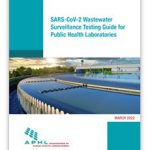 WSLH staff made major contributions to two recently released Association of Public Health Laboratories (APHL) publications.
WSLH staff made major contributions to two recently released Association of Public Health Laboratories (APHL) publications.
Senior Scientist Martin Shafer provided a large portion of the content to APHL’s “SARS-CoV-2 Wastewater Surveillance Testing Guide for Public Health Laboratories”. Shafer said his contributions were informed by the WSLH COVID Wastewater Surveillance Team.
He said the APHL guide is “…quite a seminal document that public health labs across the country will reference in building their wastewater surveillance programs”.
WI Clinical Laboratory Network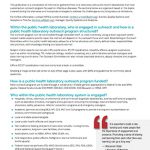 (WCLN) Coordinator Erin Bowles contributed to APHL’s “Public Health Laboratory Outreach Model Practices for Infectious Disease Programs”.
(WCLN) Coordinator Erin Bowles contributed to APHL’s “Public Health Laboratory Outreach Model Practices for Infectious Disease Programs”.
The publication is a compilation of information gathered from nine interviews with public health laboratories that have sustained an outreach program focused on infectious diseases and incorporates strategies to address the challenges surrounding resource limitations.
APHL Lab Matters Article a Reminder about Other Pathogens Circulating
WSLH CDD and Genetics Featured in UW SMPH Quarterly Magazine
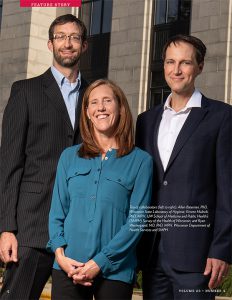
Trio of Collaborators (left to right) WSLH CDD Director Dr. Al Bateman, Dr. Kristen Malecki (UWSMPH SHOW) and Dr. Ryan Westergaard (WI DHS and SMPH)
The University of Wisconsin School of Medicine and Public Health publishes the magazine Quarterly.
The latest issue has two stories highlighting Wisconsin State Laboratory of Hygiene work in Communicable Disease and in Genetics.
Survey of the Health of Wisconsin Pivots to Collect Valuable Statewide COVID-19 Data
Illuminating the Dark: Molecular Networking as a Novel Psychoactive Substance Identification Strategy
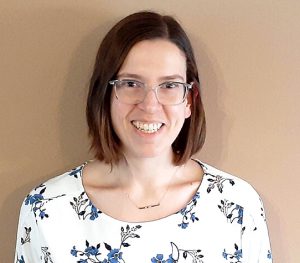 Heather Barkholtz, assistant professor in the University of Wisconsin-Madison School of Pharmacy and the WSLH Forensic Toxicology section, was awarded a $270,000+ grant from the National Institute of Justice (NIJ), the research, development and evaluation agency of the U.S. Department of Justice.
Heather Barkholtz, assistant professor in the University of Wisconsin-Madison School of Pharmacy and the WSLH Forensic Toxicology section, was awarded a $270,000+ grant from the National Institute of Justice (NIJ), the research, development and evaluation agency of the U.S. Department of Justice.
The research project is entitled Illuminating the Dark: Molecular Networking as a Novel Psychoactive Substance Identification Strategy.
According to Dr. Barkholtz –
“Illicit use of novel psychoactive substances (NPS) such as ‘spice’ and ‘bath salts’ have become increasingly popular among drug users. When a NPS emerges, its chemical structure is not known to forensic toxicologists seeking to detect them in impaired drivers, drug-facilitated crimes, overdose incidents, etc. When these NPS go undetected in forensic laboratories, public health, law enforcement, and medical professionals do not have complete information from which to make decisions.
“This project aims to use a new mass spectrometry data analysis technique called the Global Natural Product Social (GNPS) Molecular Networking interactive online data curation and analysis infrastructure to enable rapid identification of emerging NPS.
“The GNPS platform can be thought of as a dynamic, accessible, living toolkit and database for identification of previously unknown chemical structures in high-resolution mass spectrometry data. This work will demonstrate GNPS as a solution to high-resolution challenges in mass spectrometry data analysis and identification of NPS faced by the forensic community.”
Martin Luther King, Jr. Day 2022 Holiday Schedule
Please note the following changes to the Wisconsin State Laboratory of Hygiene’s operations due to the observance of the Martin Luther King, Jr. Day holiday.
The table below lists the hours of operations for our Clinical Specimen Receiving departments.
As always, if you have an off-hours emergency, please call the WSLH Emergency Pager at 608-263-3280.
| DATE |
2601 Agriculture Drive Clinical Specimen Receiving Direct phone: 608-224-4229 |
465 Henry Mall Clinical Specimen Receiving Direct phone: 608-262-5817 |
| Saturday, January 15, 2022 | 6:30 AM – 12:30 PM | 7:00 AM – Noon |
| Sunday, January 16, 2022 | CLOSED | CLOSED |
| Monday, January 17, 2022 | CLOSED |
7:00 AM – Noon NEWBORN SCREENING SPECIMENS ONLY |
